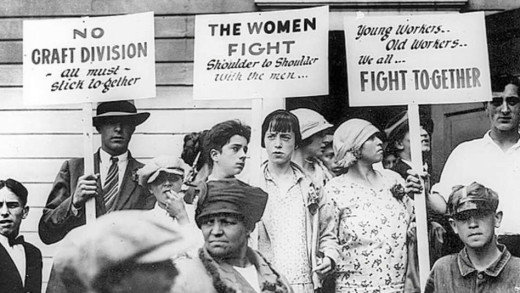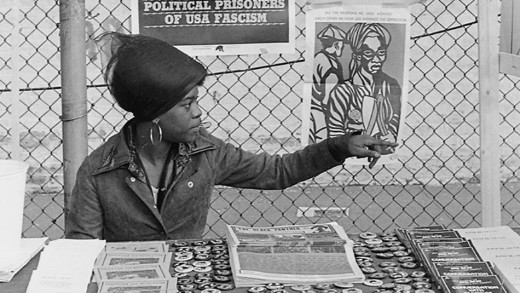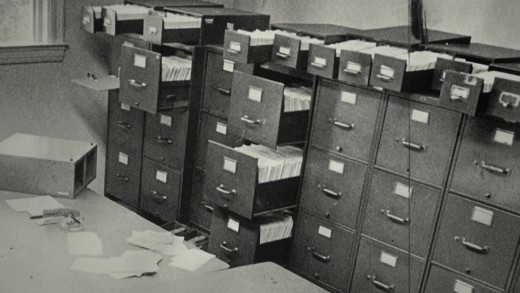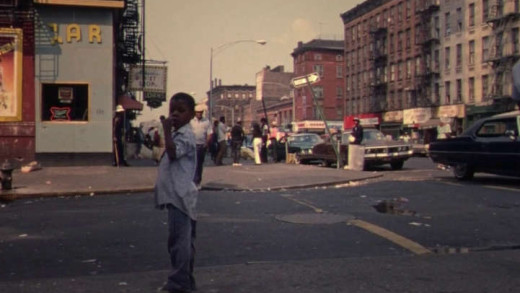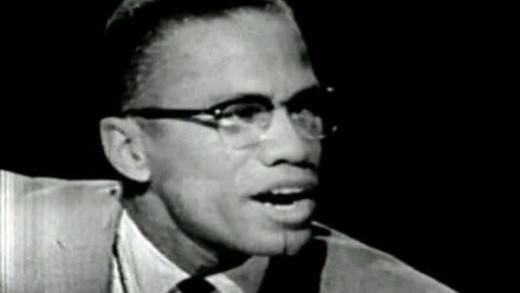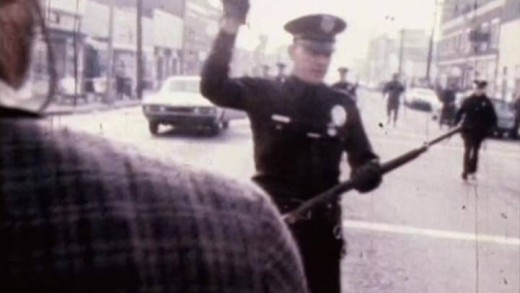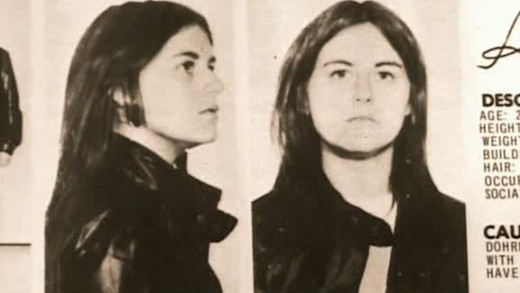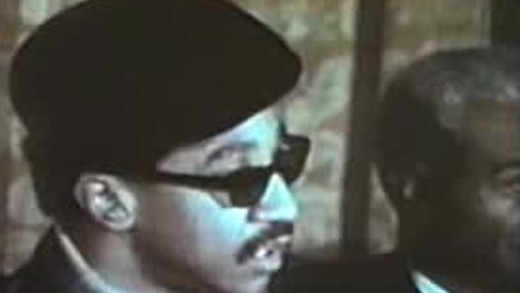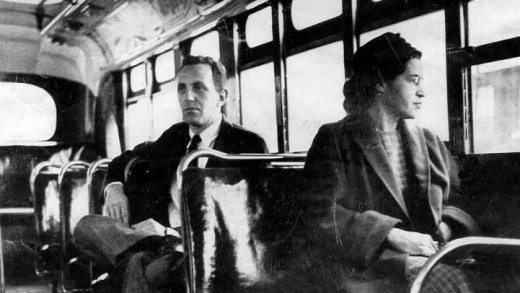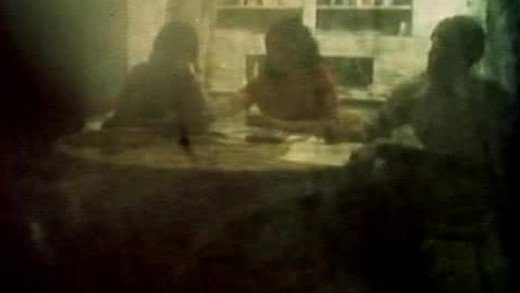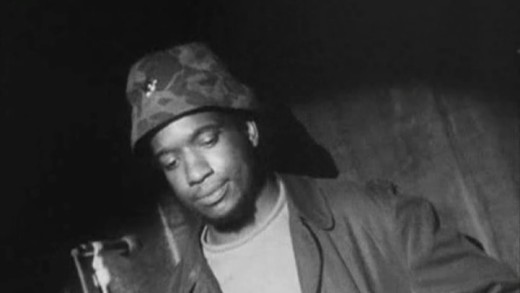The War at Home: The Untold History of Class War in the United States is a series that traverses the history of the labour movement and state repression in the United States. The series looks at history through the lens of the working class, from the Haymarket massacre in Chicago in 1886 to the Jim Crow spread in Louisiana, to the Triangle Shirtwaist tragedy of 1911, to the violent strikes and police raids of the Great Depression, and beyond. The series makes the connection between the purging of radicals from unions and the decline of union power in the 1920s, towards the 1960s and beyond.
1966, United States. A new revolutionary culture was emerging and it sought to overthrow the corrupt systems of power waging the invasion of Vietnam, amongst the struggle for equality and civil rights at home. Beginning with armed citizens' patrols to keep police accountable and challenge police brutality in Oakland California, The Black Panther Party put itself at the vanguard for social change, expanding in 1969 to community social programs, including free breakfast for school kids and community health clinics. This lead the FBI to call the movement "the greatest threat to the internal security of the country," and start an extensive government program called COINTELPRO to surveil, infiltrate, perjure, harass, discredit, destabilise and disintegrate the movement. This film chronicles the story arc of the Black Panthers successes and failures, through the voices of the people who were actually there: police, FBI informants, journalists, white supporters and detractors, and the Black Panthers themselves.
In March 1971, eight ordinary citizens broke into an FBI office in Pennsylvania, took hundreds of secret documents out, and mailed them to newspapers across the country to share them with the public. The group, calling themselves The Citizens' Commission to Investigate the FBI, undertook the actions at a time where suspicions about systemic abuse and manipulation of social and political movements by intelligence agencies were running high in the context of the Vietnam war and 1960s counter-culture. In doing so, these citizens uncovered the FBI's vast and illegal regimes, leading to insights about mass surveillance, intimidation, entrapment, and the use of provocateurs and informers for manipulation, and sabotage. Much of this would later go on to be known as part of a covert program called COINTELPRO that was run directly by J. Edgar Hoover to destroy social change movements—a history that is imperative to understand in the context of today, where state repression of social change movements continues.
Using collated footage discovered in the cellar of Swedish Television some 30 years later after recording, The Black Power Mixtape is a film that examines the evolution of the Black Power movement in the United States from 1967 to 1975. Commentaries and interviews carry the film, from leading contemporary African-American artists, activists, musicians and scholars which is divided into 9 sections based chronologically on each successive year between 1967 and 1975. The film focuses on several topics and subjects relevant to the Black Power Movement including Opposition to United States involvement in the Vietnam War, the Black Panther Party, COINTELPRO, and the War on Drugs.
Using government documents, archive footage and direct interviews with activists and former FBI/CIA officers, All Power to the People documents the history of race relations and the Civil Rights Movement in the United States during the 1960s and 70s. Covering the history of slavery, civil-rights activists, political assassinations and exploring the methods used to divide and destroy key figures of movements by government forces, the film then contrasts into Reagan-Era events, privacy threats from new technologies and the failure of the "War on Drugs", forming a comprehensive view of the goals, aspirations and ultimate demise of the Civil Rights Movement...
A secret illegal project from the 1950s, 60s and 70s called COINTELPRO, represents the state's strategy to prevent resistance movements and communities from achieving their ends of racial justice, social equality and human rights. The program was mandated by the United States' FBI, formally inscribing a conspiracy to destroy social movements, as well as mount institutionalised attacks against allies of such movements and other key organisations. Some of the goals were to disrupt, divide, and destroy movements, as well as instilling paranoia, manipulation by surveillance, imprisonment, and even outright murder of key figures of movements and other people. Many of the government's crimes are still unknown. Through interviews with activists who experienced these abuses first-hand, COINTELPRO 101 opens the door to understanding this history, with the intended audience being the generations that did not experience the social justice movements of the 60s and 70s; where illegal surveillance, disruption, and outright murder committed by the government was rampant and rapacious. This film stands to provide an educational introduction to a period of intense repression, to draw many relevant and important lessons for the present and the future of social justice.
In the 1960s and 70s, the polarisation of the political situation in the United States was becoming acute with the Vietnam War abroad and civil rights at home being but the most obvious issues. For the youth political movement, the futile methods of peaceful protest led to the rise of an idealistic faction that undertook a more extreme approach to resistance. This faction, called the Weather Underground, attempted to team up with the Black Panthers to overthrow the US government—starting with street riots, escalating to bombing government targets. Thorough archival footage and interviews of the veterans of both sides, this film covers the movement, until changing times and disillusionment brought it to an end, alongside the FBI employing an illegal series of projects called COINTELPRO to hasten it...
Through a secret program called the Counter Intelligence Program or 'COINTELPRO', the United States government set out to "disrupt dissident political organisations using infiltration, psychological warfare, harassment through the legal system and extralegal force and violence". Groups such as the Black Panther Party and others throughout the civil rights movement were targets of the program. COINTELPRO -- The FBI's War On Black America establishes a historical perspective on the measures initiated by the FBI which aimed to discredit black political figures and forces of the late 1960s and early 1970s. Combining declassified documents, interviews, rare footage and exhaustive research, it investigates the government's role in the assassinations of Malcolm X, Fred Hampton, and Martin Luther King...
Eyes on the Prize tells the story of the civil rights era from the point of view of the women and men whose extraordinary actions launched a movement that changed the fabric of American society, and embodied a struggle whose reverberations continue to be felt today. It is the story of the people--young and old, male and female, northern and southern--who, compelled by a meeting of conscience and circumstance, worked hard to eradicate a world where whites and blacks could not go to the same school, ride the same bus, vote in the same election, or participate equally in society. It was a world in which peaceful demonstrators were met with resistance and brutality--a reality that is now nearly incomprehensible to many young Americans. Through contemporary interviews and historical footage, Eyes on the Prize traces the civil rights movement from the Montgomery bus boycott to the Voting Rights Act; from early acts of individual courage through the flowering of a mass movement and its eventual split into factions.
Underground is a film about the Weather Underground Organisation—a group founded as a militant faction of the civil rights and anti-war movement of the 1960s and 1970s. The film combines interviews with members of the group after they went underground who explain how they became radicalised amongst the political happenings in the United States at the time, as well as the revolutionary struggles in Cuba, Russia and China, and the history of struggles over Native American rights and labour issues. Also detailed is the group's analysis of American society, addressing those who have inspired them, and further explaining the reasons behind their militancy, while also introducing the issue of tactics. We see the use of property destruction as a way to bring about change and destabilise the current political order. Underground takes an intimate look at the inner workings of the Weather Underground and their strong internal collective identity, providing a record of how a bunch of middle-class Americans became self-styled militant revolutionaries, raising questions not only about the merits of their struggle, but also about past and future radical actions.
The Murder of Fred Hampton is a film which began with the intention of documenting Fred Hampton and the Illinois Black Panther Party during 1971, but during the film's production, Hampton was murdered by the Chicago Police Department and FBI. The film project then quickly split into two parts: the portrait and biography of Fred Hampton, and an investigative report into his murder. The result chronicles important historical context. Hampton was a radical activist and deputy chairman of the national Black Panther Party, during the civil rights and black power movements in the United States. Hampton was killed as part of COINTELPRO—the illegal "counter-intelligence program" run by the FBI, aimed at destroying domestic political organisations through surveillance, infiltration, disruption, threats, violence and assassinations.
